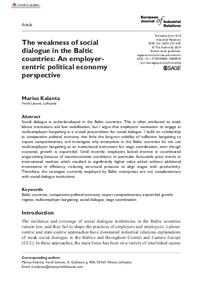The weakness of social dialogue in the Baltic countries: an employer-centric political economy perspective

European Journal of Industrial Relations
2020
26
3
September
227-242
social dialogue ; wage policy ; export ; collective bargaining
Labour relations
https://doi.org/10.1177/0959680119838933
English
Bibliogr.;Statistics
"Social dialogue is underdeveloped in the Baltic countries. This is often attributed to weak labour institutions and low mobilization, but I argue that employers' motivation to engage in multi-employer bargaining is a crucial precondition for social dialogue. I build on scholarship in comparative political economy that links the long-run stability of collective bargaining to export competitiveness, and investigate why enterprises in the Baltic countries do not use multi-employer bargaining as an institutional instrument for wage coordination, even though economic growth is export-led. Until recently, employers lacked interest in coordinated wage-setting because of macroeconomic conditions: in particular favourable price trends in international markets which resulted in significantly higher value added without additional investments in efficiency, reducing structural pressure to align wages with productivity. Therefore, the strategies currently employed by Baltic enterprises are not complementary with social dialogue institutions."
Digital
The ETUI is co-funded by the European Union. Views and opinions expressed are however those of the author(s) only and do not necessarily reflect those of the European Union or the ETUI.